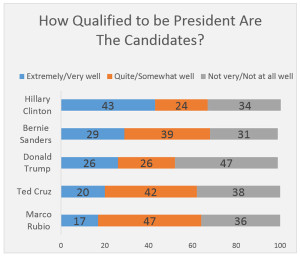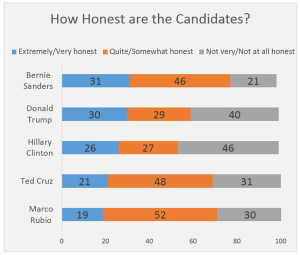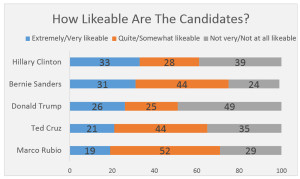Election 2016 – Americans View the Candidates: Are They Qualified, Likable, Honest?
2/8/2016
Prior to the primaries, Hillary Clinton was viewed as the most qualified candidate for president according to the latest nationwide poll conducted by the Fishlinger Center for Public Policy Research at the University of Mount Saint Vincent. However, Americans have doubts about her honesty and integrity.
Overall, there are strong partisan differences in how the candidates are viewed. Forty-five percent of Republicans regard Donald Trump as honest; only 18 percent of Democrats agree. About 4 in 10 Democrats say Senator Bernie Sanders is likeable, as do about half many Republicans.
The poll was conducted last month, before the Iowa caucuses and New Hampshire primaries were held.
Which Candidates are Qualified to be U.S. President?
Seventy percent of self-identified Democrats consider Mrs. Clinton extremely or very qualified to be president. However, most Republicans disagree: 55 percent say the former Secretary of State is not very or not at all qualified. Among independents, 43 percent say she is not qualified for the presidency and only 28 percent consider her extremely or very qualified.
Mr. Sanders is seen as qualified by 42 percent of Democrats, but only 19 percent of Republicans. Independents are more closely divided: 25 percent say Mr. Sanders is extremely or very qualified and 32 percent say he is not very or not at all qualified for the office.
 Self-identified Republicans are less sure about the qualifications of the candidates running for their party’s nomination. Four in 10 (39 percent) Republicans say Mr. Trump is extremely or very qualified for the White House. Nearly as many (38 percent) say the same thing about Senator Ted Cruz, and 30 percent regard Sen. Marco Rubio as extremely or very qualified.
Self-identified Republicans are less sure about the qualifications of the candidates running for their party’s nomination. Four in 10 (39 percent) Republicans say Mr. Trump is extremely or very qualified for the White House. Nearly as many (38 percent) say the same thing about Senator Ted Cruz, and 30 percent regard Sen. Marco Rubio as extremely or very qualified.
Three in 10 (29 percent) independents say Mr. Trump is qualified; 43 percent say he is not very or not at all qualified. Independents are also less positive about the credentials of Mr. Cruz and Mr. Rubio. Only about 15 percent regard either man as especially qualified, while more than a third regard them both as unqualified.
Honesty and Integrity
Nearly half of the public says Mrs. Clinton is not very or not at all honest. In fact less than half of Democrats (45 percent) regard her as particularly honest, and most Republicans (73 percent) and independents (56 percent) say Mrs. Clinton is not very or not at all honest.
Mrs. Clinton has had problems for many years with perceptions of her trustworthiness. In recent years, the controversy over her email use while Secretary of State and the Congressional investigation in the attack on the U.S. consulate in Benghazi has taken a toll. And while she was First Lady, controversies included investigations into the Whitewater real estate investments.
According to PolitiFact, a fact-checking website, three-quarters of statements made by Mrs. Clinton are true or mostly true. In comparison, not quite half of statements made by her opponent for the Democratic nomination, Mr. Sanders are judged true or mostly true by Politifact.
But the public sees Mr. Sanders as more trustworthy than Politifact. Forty-two percent of Democrats say Mr. Sanders is extremely or very trustworthy, similar to the 45 percent who say the same about Mrs. Clinton. But only 22 percent of Republicans and 25 percent of independents (15 percent) agree.
 Politifact’s research casts doubt on the veracity of the Republican candidates as well. Three-quarters of Mr. Trump’s statement are classified as false or mostly false (including a category called ‘pants on fire’) and only 7 percent are identified as true or mostly true. Nearly as negative is Politifact’s assessment of Mr. Cruz: 69 percent are characterized as false or mostly false and only 16 percent are regarded as true or mostly true. The evaluation of Mr. Rubio is more closely divided: Politifact says 41 percent of Mr. Rubio’s statements are false or mostly false and 37 percent are deemed true or mostly true.
Politifact’s research casts doubt on the veracity of the Republican candidates as well. Three-quarters of Mr. Trump’s statement are classified as false or mostly false (including a category called ‘pants on fire’) and only 7 percent are identified as true or mostly true. Nearly as negative is Politifact’s assessment of Mr. Cruz: 69 percent are characterized as false or mostly false and only 16 percent are regarded as true or mostly true. The evaluation of Mr. Rubio is more closely divided: Politifact says 41 percent of Mr. Rubio’s statements are false or mostly false and 37 percent are deemed true or mostly true.
Again, the public has a generally somewhat less negative impression of the Republicans’ honesty than Politifact. While most Democrats (62 percent) say Mr. Trump is not very or not at all honest, only 19 percent of Republicans and 35 percent of independents agree. Also, few Republicans doubt the trustworthiness of either Mr. Cruz or Mr. Rubio. Among Democrats, 40 percent say Mr. Cruz is not honest and 35 percent say that 0f Mr. Rubio. About a third of independents regard either of the Republican senators as not very or not at all honest.
Are the Candidates Likeable?
In a memorable moment during the 2008 presidential campaign, then-candidate Barack Obama said to Mrs. Clinton, “You’re likable enough, Hillary.” How likeable is Mrs. Clinton now?
A third of Americans say she is extremely or very likeable while nearly 40 percent regard her as not very or not at all likeable. Most Democrats (57 percent) like her, while most Republicans (61 percent) and nearly half (48 percent) of independents do not consider Mrs. Clinton likeable.
 Republicans are closely divided in their judgement of Mr. Trump’s likeability. Thirty-six percent of Republicans say he is extremely or very likeable and nearly as many, 33 percent, consider him not very or not at all likeable. Independents are more inclined to regard Mr. Trump negatively. Only 21 percent of independents say Mr. Trump is extremely or very likeable, while twice as many (42 percent) say he is not very or not at all likeable.
Republicans are closely divided in their judgement of Mr. Trump’s likeability. Thirty-six percent of Republicans say he is extremely or very likeable and nearly as many, 33 percent, consider him not very or not at all likeable. Independents are more inclined to regard Mr. Trump negatively. Only 21 percent of independents say Mr. Trump is extremely or very likeable, while twice as many (42 percent) say he is not very or not at all likeable.
The unanswered question is how these factors will play out during the primary season and how much of a role they will ultimately have in November.
Survey Methodology
The fieldwork for the Fishlinger Center poll was conducted by Ipsos Public Affairs. Online interviews with 1,251 adults were collected January 14-22, 2016. Sampling for the survey used a blended approach, combining the Ipsos iSay panel with Ampario sample (a blend of external panel and non-panel sources). Ipsos measures the precision of its online surveys using a credibility interval to measure sampling error. The survey of 1,251 respondents has a credibility interval of plus or minus 2.8 percentage points. The credibility interval may be larger for subgroups. The poll is subject to other potential sources of error, including, but not limited to coverage and measurement error. Data were weighted to match the national population on age, sex, Hispanic origin and race.
About the Fishlinger Center for Public Policy
The Fishlinger Center for Public Policy Research opened in February 2015 at the University of Mount Saint Vincent. The Center, a member of the American Association for Public Opinion Research (AAPOR), conducts deep and broad studies of public opinion on key public policy concerns through independent and objective research conducted by students, faculty, and other members of the academic community.
By providing a forum for discourse that can stimulate intelligent dialog about issues that deeply affect all Americans, the Center illustrates and enhances the relationship between the work of the College and the common good.
About the University of Mount Saint Vincent
Founded in 1847 by the Sisters of Charity, the University of Mount Saint Vincent offers nationally recognized liberal arts education and a select array of professional fields of study on a landmark campus overlooking the Hudson River. Committed to the education of the whole person, and enriched by the unparalleled cultural, educational and career opportunities of New York City, the College equips students with the knowledge, skills and experiences necessary for lives of achievement, professional accomplishment and leadership in the 21st century.
